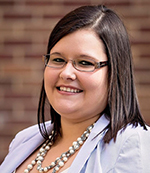As the 2024 NAM Pharmacy Fellow, Dr. Jennifer Bacci relishes the opportunity to tout the benefits that community pharmacies offer.
By Joseph A. Cantlupe
There are not many aspects of pharmacy in healthcare that Dr. Jennifer Bacci, endowed associate professor in innovative pharmacy practice at the University of Washington School of Pharmacy, has not studied, written about or lectured on, a testament to her varied interests as an academic. After working in community pharmacy, Bacci said she turned to academia with the “goal of working across partners to accelerate community pharmacy transformation.” She has examined everything from closing gaps in care, targeting medication adherence, ensuring vaccinations, evaluating opioid use, and treating diabetes and epilepsy. “All of that is with the focus on being responsive to the needs of community pharmacy practice and patients. I always have been driven by what I’m hearing from those frontline practitioners about the things that are impacting their day-to-day practice and keeping them from being able to provide the care to patients that they want to provide.”
That community pharmacy perspective deeply touches her teaching, and that thrust is expected to be a strong part of her work after being named one of seven outstanding health professionals for the class of 2024 National Academy of Medicine (NAM) Fellowship. The fellows are chosen based on their professional qualifications, reputations and accomplishments, as well as the relevance of their current field expertise to NAM’s work.
Bacci is thrilled by the recognition and the prospect of working with NAM. “I think it takes a little while to sink in—it’s a great honor. There are many incredible professionals in pharmacy who are deserving of this.” She decided to apply for the fellowship “because it is merging what is happening in community pharmacy and my own professional growth. I’ve been really focused on how we grow patient care and community pharmacies. This fellowship is that opportunity to really focus on the policy piece for me but also to raise awareness within health policy circles about community pharmacy and what’s happening.”
Bacci and the other scholars will continue their primary academic or research posts while engaging with the National Academies health and science policy work over a two-year period. They will also work with an expert study committee or roundtable related to their professional interests, including contributing to reports or other products. A flexible research grant will be awarded to every fellow.
Opening Doors
“We always talk about the community pharmacies as the front door to the profession,” Bacci said. “There’s a wide spectrum of what it means to be a community pharmacy; not every community pharmacy looks the same. There’s a lot more that we can do [at a community pharmacy] than say, ‘here are your medications, I’ll see you next month.’”
Patients go in and out of pharmacies without appointments, asking pharmacists about medications and illnesses. Surely, pharmacies are intimately involved with the public, but they face myriad issues around staffing, medication shortages and safety concerns. They are also the focus of much debate regarding pharmacist payments, which have been stagnant or decreasing. In addition, workplace conditions and stress are taking a toll on efforts to recruit new hires, according to academic studies. Those issues are impacting the ability to train and retain pharmacy employees.
But the demand for pharmacies continues to rise, leading to new opportunities, particularly for recent graduates. Through it all, “community pharmacy is at a very important point in terms of what the future looks like,” Bacci emphasized. “I’m really focused on how we grow patient care in communities, how policy frames what we can do in the community and raising awareness within health policy circles about community pharmacy. We’re not trying to replace physicians, but we have different and complementary skills so when we work together with physicians and other healthcare professionals, that’s when we can provide the best care possible. Our unique knowledge and skills are important to


